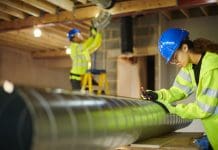A new survey for Deconstruction, a campaign aimed at improving perceptions of the industry and attracting new construction talent, has found that 67% of adults and 77% of students aged 18-24 would not contemplate working in construction
Over the next five years, the Construction Industry Training Board (CITB) estimates that an additional 225,000 workers will be needed by 2027 to meet demand.
Over half of those surveyed also perceived the sector to lack the commitment to achieving net zero. This is also worrying because the sector has tried to make advanced strides to demonstrate its green credentials.
It means the message isn’t getting to the industry’s target audience. Although apprentice numbers are rising – more than 26,000 started in the year to July 2022 – the trend has generally declined.
The industry has work to do to improve its image
Decarbonisation, data, digital and analytics skills will be in high demand as we move towards net zero. This is challenging territory for those who’ve been in the industry for a while, so the industry needs to consider how to attract the best construction talent in these areas and retrain the current workforce.
Those seeking to enter the industry should feel excited to see how they could meet the challenge of the climate emergency we are currently facing in construction – but the Deconstruction findings show this is far from the case.
For a start, the industry could make more of promoting its increasing use of cutting-edge tech like robots, drones, AI and augmented/virtual reality. Many people still think the industry is stuck in the past.
Investing in construction talent
Companies could also sponsor learning programmes for those at the beginning of their careers in construction at further education institutions, enabling students to develop knowledge and transferable skills for a career in a digital, sustainable, and collaboratively built environment.
Such investment could pay dividends, giving those companies first-hand access to those with a real passion and desire to progress, potentially leading to apprenticeships within their business.
At McBains, for example, we’re trying to play our part by supporting learning programmes for 14-16-year-olds.
We sponsored a ‘Design Engineer Construct!’ (DEC) learning programme at Hopwood Hall College and University Centre in Rochdale, which aims to arm young people with knowledge and transferable skills for a career in a digital, sustainable and collaboratively built environment.
Alongside work experience placements, we are also going into schools – such as Mossbourne Sixth Form in Academy in Hackney, London – supporting students with architecture projects and guided site visits of our works.
By partnering with Mossbourne and similar academies, we hope to support emerging construction talent. The three-year commitment will allow us to get to know the students, support them in their development and career progression, and identify those with a real passion and desire to progress in DEC, potentially leading to apprenticeships within the business.
Another key area to tackle to attract and retain new construction talent in the construction industry is to improve fairness, inclusion and respect (FIR). The latest FIR culture impact report by the Supply Chain Sustainability School reports that a person’s ethnic background is the factor most likely to influence their experience in the construction industry and that women are still reporting to be treated less fairly at work than men.
Engaging more women in the construction industry
According to the CITB, women remain less than 14.6% of the UK construction workforce, which means the industry is missing out on a vast construction talent pool.
Just 5.4% of construction workers are from ethnic minority backgrounds, compared to around 13.8% of the UK population and 40% of the London population, according to the CIC. The industry, therefore, needs to invest in training, better promote its career advancement opportunities and improve work-life balance, as many prospective employees – particularly women – still feel the industry is behind the curve in these areas.
Investing in these areas will help in improving the representation of minority groups progressing into site manager and leadership roles whilst at the same time improving retention rates and attracting future entrants to the industry.
The sector is also often perceived as being behind the times on employee well-being. According to a survey published earlier this year, 82% of builders in the UK suffer mental health problems due to work-related issues, and 92% said they did not feel able to discuss their mental health with others in the modern workplace, which needs to change.
The sector is developing a culture where employees can feel comfortable speaking openly and honestly about these issues, but this needs to happen in this area.
Mark Leeson and Ana Martins are both directors at McBains, a property and construction consultancy














